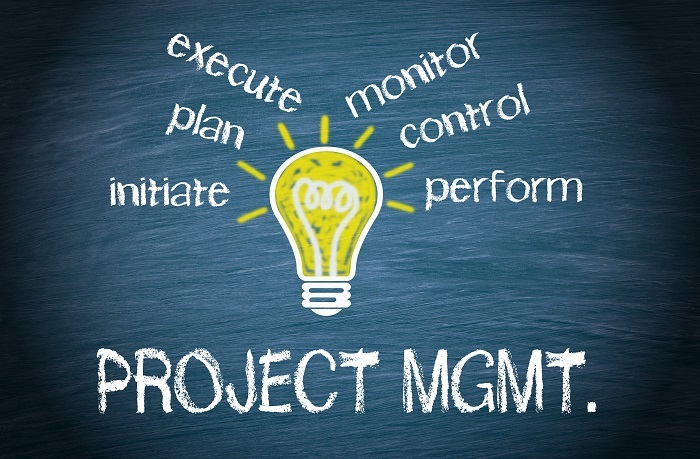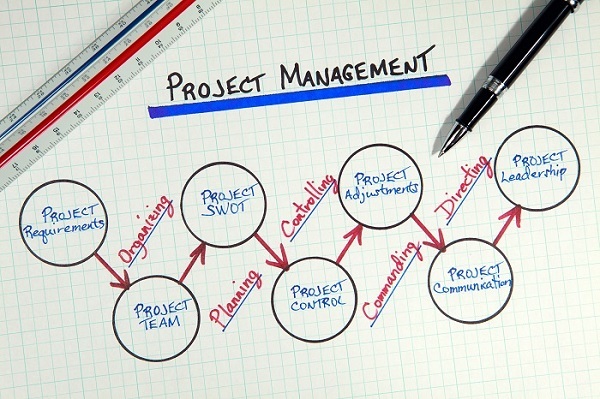
 Data Structure
Data Structure Networking
Networking RDBMS
RDBMS Operating System
Operating System Java
Java MS Excel
MS Excel iOS
iOS HTML
HTML CSS
CSS Android
Android Python
Python C Programming
C Programming C++
C++ C#
C# MongoDB
MongoDB MySQL
MySQL Javascript
Javascript PHP
PHP
- Selected Reading
- UPSC IAS Exams Notes
- Developer's Best Practices
- Questions and Answers
- Effective Resume Writing
- HR Interview Questions
- Computer Glossary
- Who is Who
What is Project Management and Why is It Important?
Project management is an important step for any group or team that wants to finish a project on time and on budget.
In this article, we will talk about the key principles of project management, the benefits of good project management, the project management lifecycle, the tools and techniques used in project management, and the role of the project manager.

By following a project management lifecycle and using different tools and methods, project managers can make sure their projects are successful and meet the expectations of stakeholders.
Key Project Management Takeaway
Project management is the process of keeping track of how a project is planned, set up, and finished. It involves setting goals, making a plan, dividing up the work, and keeping an eye on how things are going.
Methods for managing projects that work well can cut costs, increase output, and help reach goals more quickly and efficiently.
Key principles of project management are good communication, good planning, managing risks, and monitoring and evaluating the project all the time.
Effective project management gives you a way to look for potential problems and find ways to avoid them.
The project management includes planning, carrying out the plan, keeping track of and controlling the process, and finishing up.
Project managers use tools and methods like Microsoft Project, Excel, and Jira to plan, run, and keep an eye on projects.
The project manager is responsible for making sure the project is planned, carried out, and finished on time and on budget. They are very important for making sure that projects are finished successfully and that the expectations of all stakeholders are met.
Key Principles of Project Management
The ability to convey one's thoughts clearly is crucial. More than half of all project managers (56%) say that effective communication is crucial to the completion of their projects. The success of any project depends on everyone involved knowing their specific roles, responsibilities, and deadlines.
One more fundamental principle is making good plans. In the same poll, nearly four in ten (39%) project managers blamed insufficient planning for a failed endeavor. Planning effectively calls for a detailed project plan that specifies objectives, timelines, and necessary resources.
Additionally, one of the most fundamental tenets of project management is the management of risks. According to research by PricewaterhouseCoopers, companies that take measures to mitigate potential risks to projects are 13 times less likely to waste money overall. Managing risks entails figuring out how to deal with or prevent them.
Finally, project management entails ongoing monitoring and evaluation. Project managers can ensure that the project stays on track and meets its objectives by tracking progress and evaluating results on a regular basis.
What is Project Management?
Project management refers to the process of overseeing the planning, organization, and completion of a project. To finish the project on schedule and under budget, it is necessary to set goals, create a schedule, divide up the work, and monitor the development.
Organizations that use project management methodologies waste 28 times less money than those that do not, according to a Project Management Institute study.
Because teams perform better when they have a defined strategy and tangible outcomes to strive for, efficient project management can also increase productivity. There is a chance that this could increase your financial gain or improve your return on investment.
Any team that cares about completing its projects on time and within its budget should learn project management. When businesses use effective project management strategies, they are able to reduce costs, boost output, and accomplish their goals with greater efficiency.
Benefits of Effective Project Management
Organizations benefit from effective project management in a variety of ways, including increased success rates, increased productivity, better resource management, and cost savings. According to a Project Management Institute (PMI) report, companies that use project management practices waste 28 times less money than those that do not.
In addition, PM helps businesses finish projects on time and under budget. A PMI report found that businesses that employ PM methodologies were 70% more likely to see their projects through to completion on schedule, compared to those who did not.

Last but not least, successful project management provides a framework for spotting potential pitfalls and working around them. Companies that implement risk management strategies see an increase in their success rate to 75%, while those that do not see it drop to 28%, as stated in the same PMI report.
The process of planning, executing, monitoring, and closing a project is referred to as the project management lifecycle. It is a systematic approach to project management that ensures that all aspects of the project are properly managed from start to finish.
The project management lifecycle is typically divided into five stages: planning, execution, monitoring and control, and closure. The project is defined and its goals and objectives are established during the initiation phase. Creating a detailed project plan, identifying resources, and developing a schedule are all part of the planning phase.
The project plan is carried out during the execution phase, while the monitoring and control phase involves tracking progress and making necessary adjustments. The project is completed and its success is evaluated during the closure phase.
Organizations can ensure that all aspects of a project are properly managed by following a project management lifecycle, reducing the risk of delays, cost overruns, and other project-related issues.
Tools and Techniques used in Project Management
Project management entails the effective use of various tools and techniques to plan, execute, and monitor projects. The top three most popular project management tools used by organizations, according to a Wellingtone survey, are Microsoft Project (33%), Excel (30%), and Jira (15%).
Tools for managing projects include applications for planning tasks, organizing available resources, and coordinating efforts with others. Tasks can be scheduled, resources can be allotted, and progress can be tracked with the help of these tools for project managers.
Project managers use a toolbox's worth of techniques in addition to the tools at their disposal. Examples include handling risks, implementing changes, and communicating with stakeholders. Managing risks entails figuring out what could go wrong with a project and then working to make sure it doesn't. The term "change management" refers to the practice of overseeing alterations to a project's defined parameters, such as its scope, timeline, and budget.
By making use of various resources, project managers can boost productivity, decrease expenses, and boost the likelihood of a successful project. In addition, they can keep everyone in the loop about what's happening with the project at all times.
Role of the Project Manager
The project manager is accountable for project planning, execution, and completion on time and within budget. They are critical in ensuring that projects are completed successfully and that stakeholders' expectations are met.
The Project Management Institute (PMI) found that organizations with highly effective project management practices had a success rate of 92% for their projects, while organizations with low levels of project management effectiveness only saw a success rate of 32%.
The project manager is responsible for defining the project scope, developing project plans, managing project resources, monitoring project progress, and ensuring that the project is completed on time and within budget. They must also communicate effectively with stakeholders, manage risks and issues, and maintain project documentation.
Strong leadership skills, excellent communication skills, and the ability to manage multiple tasks and priorities are required of effective project managers. They must also be able to inspire their teams and foster a collaborative and productive workplace.

